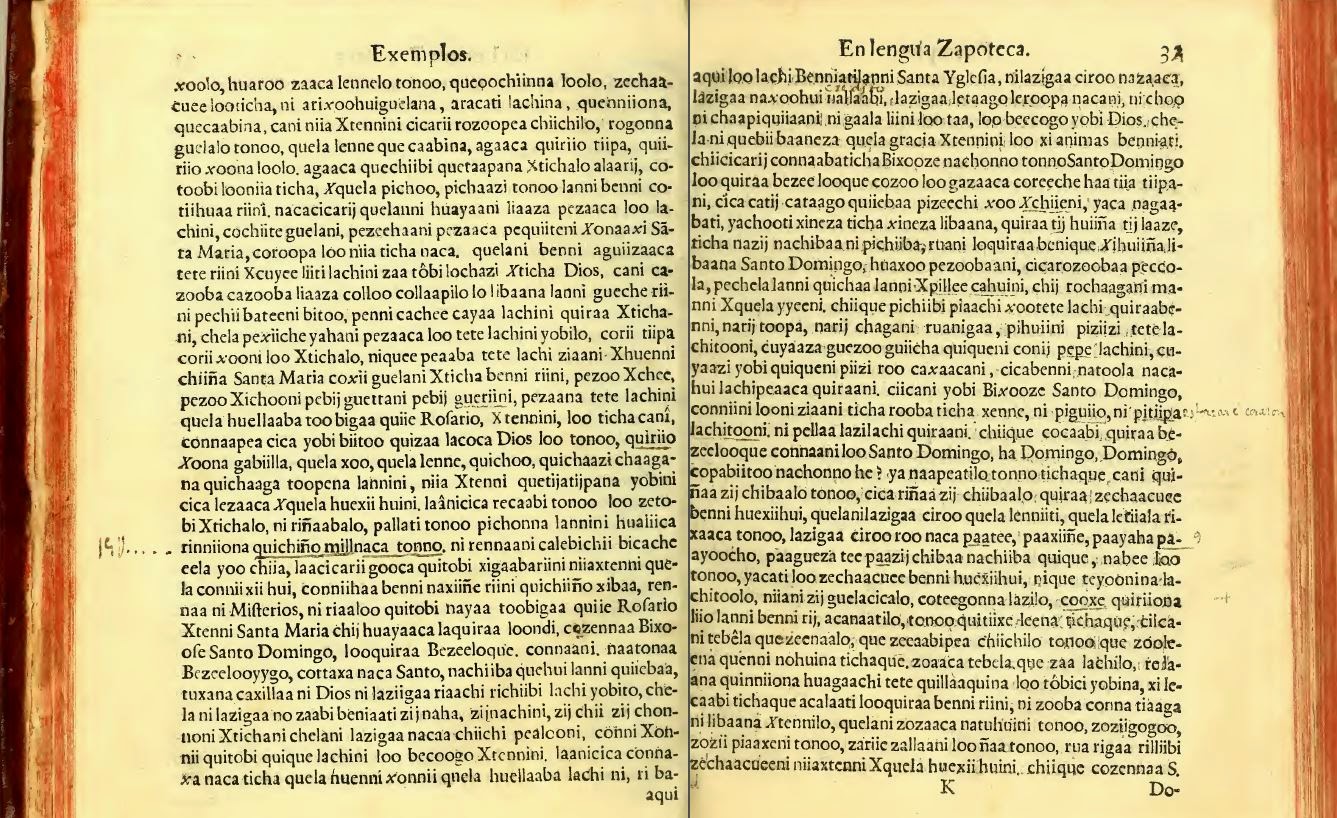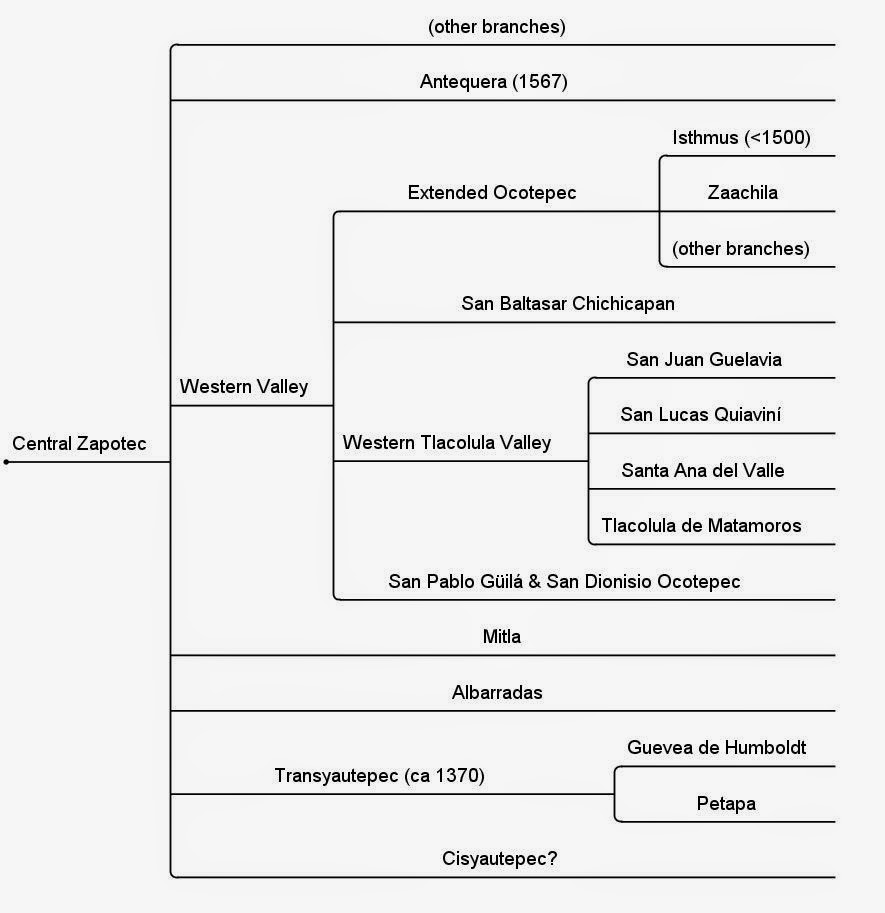I've been enjoying tracking the little stories embedded in the Colonial Zapotec and Timucua materials.
Here is one story in Spanish and Timucua from the 1613 Timucua Confessional:
My transcription and translation of the Spanish:
Here is one story in Spanish and Timucua from the 1613 Timucua Confessional:
My transcription and translation of the Spanish:
No sólo la sacramental confesión cierra la boca al Demonio para que no pueda acusar al pecador, y le confunda: pero aún abre el secreto que tiene en el alma de él que de veras se convierte a Dios, por cuya revelación pierde Satanás, todo el derecho que tenía en el pecador. Qui denuntiat arcana amici fidem perdit. Él que descubre los secretos pierde la amistad del amigo secreto. Escondido del Demonio es el pecado en alma del pecador, la confesión santa le descubre y revela, y descubierto pierde la inicua amistad, que el pecador tenía con la antigua serpiente, lo que sumamente deberíamos procurar.
Encontrando San Macario al demonio, todo cargado de redomillas, le preguntó, “Qué significan esas redomillas?” [f30] Respondió Satanás, “Bebidas son que doy a los monjes, cuando los tiento y llevo tantas porque si no quieren beber, de una beban de otra.” “Dime,” preguntó Macario, “Y bebió de ellas alguno?” Respondió el Demonio, “Teoristo bebió de ellas.” Dada esta respuesta, desapareció el enemigo. Como fuese San Macario a donde estaban los monjes, y le saliese ellos a recibir con palmas en sus manos fuese derecho a la celda de Teoristo, rogándole se confesase con él, de todos sus pensamientos, lo cual hizo el monje con mucha humildad tornando a encontrar el Santo al Demonio le preguntó, cómo le iba con sus monjes, respondió que mal, porque ya todos quedaban santificados por medio de la confesión.
Ninguna cosa tanto desagrada al Demonio cuanto el revelarle los secretos por eso se colgó Achitofel, porque Cusi reveló su secreto, y traición a David, ninguno encomendará su secreto de buena gana, a los que son muy parleros, y así el Demonio, a los que son muy solícitos en las confesiones, de mala gana encomienda los secretos de sus malas sugestiones y pecados, porque ve, que le guardan la mala fidelidad, que él quería. Cesareo cuenta, que fue a París, un gran Teólogo y afamado Predicador, el cual estando una vez en su oratorio, vio al Demonio a quién conjurando, preguntó “Cuál es la cosa entre los hombres, que más pesadumbre, y enojo os da a vosotros?” Respondió Satanás, “Ninguna cosa nos da tanta molestia, ni nos quita tanto las fuerzas, cuanto la pura y limpia confesión. Cuando está el hombre, en pecado mortal todo le tenemos atado porque no cumpla la voluntad de Dios, sino la muestra, por confesados sus pecados queda luego libre, de nuestras manos, y hábil para toda buena obra.” Lo mismo respondió el Demonio, al Angelico Doctor Santo Tomas.
(My translation)
The sacramental confession doesn’t only close the mouth of the Devil so that he can’t accuse the sinner, and confuse him [the devil], but it even opens the secret that he [the devil?] has in the soul of him who truly converts himself to God, through whose revelation Satan loses all right that he had to the sinner. “He that discloseth the secret of a friend loseth credit.”[1] He who discovers secrets loses the friendship of the secret friend. Hidden by the Devil is the sin in the soul of the sinner; the holy confession discovers and reveals it, and discovered loses the nefarious friendship which the sinner had with the ancient serpent, that which we should extremely try to do.
Saint Macario, encountering the devil, all packed with little bottles, asked him, “What do those little bottles mean?” Responded Satan, “They are drinks that I give to the monks when I tempt them, and I carry so many because if they don’t want to drink from one, they drink from another.” “Tell me,” asked Macario, “And did someone drink from them?” Responded the Devil, “Teoristo drank from them.” Having given this response, the enemy disappeared. Then San Macario went to where the monks were, and they left to receive him with palms in their hands; he went right to Teoristo’s cell, begging him to confess himself with him of all his thoughts, which the monk did with great humility. The Saint returning to find the Devil, he asked him how it went with his monks. [The devil] responded that [it went] badly, because they all were now sanctified through the method of confession.
Nothing displeased the Devil as much as revealing his secrets; because of this Achitofel hung himself, because Cusi revealed his secret and betrayal of David. No one will entrust his secret willingly to those who are very talkative, and in this way the Devil, to those who are very obliging in the confession, grudgingly entrusts the secrets of his evil suggestions and sins, because he sees that they harbor unfaithfulness, which he wanted. Cesareo says that a great Theologian and famed Preacher went to Paris, who being one time in prayer, saw the Devil; conjuring him, he asked, “What is the thing among men which gives you the most grief and anger.” Responded Satan, “Nothing gives us more trouble, nor takes strength from us as much as pure and clean confession. When a man is in mortal sin, we have all of him tied, because he doesn’t fulfill the will of God; but it is shown to him through having confessed his sins, he remains afterwards free from our hands, and able to do any good work.” The same responded the Devil to the Angelic Doctor Saint Thomas.
==
I was able to find another version of the Spanish story here on Google Play:
Significant I think, is that this version is followed by the same discussion of Achitofel and Chusi that follows the San Macario episode in Timucua.
This book
Libro intitulado Iornadas para el Cielo
by Cristobal Moreno (O.F.M) published in 1596 seems like the source for many things in the Timucua confessional.






































